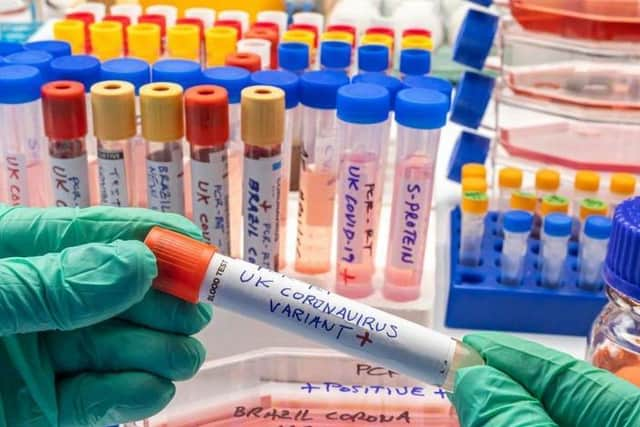What we know about the Indian Covid-19 variant so far as cases are confirmed in Yorkshire
This article contains affiliate links. We may earn a small commission on items purchased through this article, but that does not affect our editorial judgement.
Scientists are keeping a close eye on the spread of the variant across the UK, with new figures from Public Health England (PHE) on Thursday expected to show a big rise in cases.
Cases have been confirmed in York, public health chiefs have said. They are the first cases of the variant to be confirmed in Yorkshire.Speaking at a primary school in Ferryhill, County Durham, the Prime Minister said: “It is a variant of concern, we are anxious about it.
Advertisement
Hide AdAdvertisement
Hide Ad“At the moment there is a very wide range of scientific opinion about what could happen.


“We want to make sure we take all the prudential, cautious steps now that we could take, so there are meetings going on today to consider exactly what we need to do.
“There is a range of things we could do, we are ruling nothing out.”
Sage Meeting
The Scientific Advisory Group for Emergencies (Sage) is holding a meeting on Thursday (May 13) to discuss the spread of the Indian variant, amid fears it could have an impact on the Government’s road map out of lockdown.
Advertisement
Hide AdAdvertisement
Hide AdJoin our coronavirus Facebook group for the latest news and advice as soon as we get it
Bolton has one of the highest rates of the Indian variant in the UK, thought to be mostly concentrated in the under-25s.
Asked if local lockdowns were possible, Mr Johnson said: “There are a range of things we could do, we want to make sure we grip it. Obviously there’s surge testing, there’s surge tracing.
“If we have to do other things, then of course the public would want us to rule nothing out. We have always been clear we would be led by the data.
Advertisement
Hide AdAdvertisement
Hide Ad“At the moment, I can see nothing that dissuades me from thinking we will be able to go ahead on Monday and indeed on June 21 everywhere, but there may be things we have to do locally and we will not hesitate to do them if that is the advice we get.”
Vaccine surge
Downing Street also said officials would not “rule anything out” when asked if the Government was considering surge vaccinations to accompany surge testing in areas with spikes of new variants.
The Prime Minister’s official spokesman told a Westminster briefing: “We want to consider all options.
“The meeting is happening with Sage today and should they come out with any further updates on this variant originating in India and the epidemiology in the UK then we will consider it.”
Advertisement
Hide AdAdvertisement
Hide AdEarlier, Professor Steven Riley, from Imperial College London, said whether the road map for England continued on its planned trajectory was “a Government decision” but suggested the UK was currently in a good place.
He told Times Radio: “I think there’s two key things that have got to be kind of evaluated – if infections go up, how quickly will they go up? But then after that, are they linked to the hospitalisations?
“The top-line Government policy is driven by protecting the NHS, so even if infection starts to go up, we then need to assess whether that’s bringing a lot of new cases into hospitals, and there’s certainly no sign of that at the moment.”
Confidence
On Wednesday, the European Medicines Agency said it was “pretty confident” that vaccines currently in use would be effective against the Indian variant – a view echoed by some British scientists.
Advertisement
Hide AdAdvertisement
Hide AdThree types of the Indian variant have been identified in the UK, one of which is a variant of concern.
But Professor James Naismith, from the University of Oxford, said not enough was known to say for sure whether the variant could frustrate the UK’s vaccination programme.
“The vaccines don’t 100% prevent infection for people,” he told BBC Radio 4’s Today programme. “What they do is, they almost 100% prevent hospitalisation and serious illness. We don’t know enough to know yet whether the Indian strain will behave differently than that.
“So even the regular virus can infect people who have been vaccinated and sometimes you do get reinfection.”
Advertisement
Hide AdAdvertisement
Hide AdProf Naismith said the variant may spread “way beyond” the local areas where it has been detected, suggesting much wider community transmission of the variant.
“I think we should view it as a countrywide problem,” he said. "It will get everywhere. We keep learning this lesson, but we know that this will be the case.”
Prof Naismith said he did not believe local restrictions would work to contain the variant, adding: “When we tried locally having different restrictions in different regions that didn’t really make any difference. So I don’t think thinking about a localised strategy for containment will really work.”